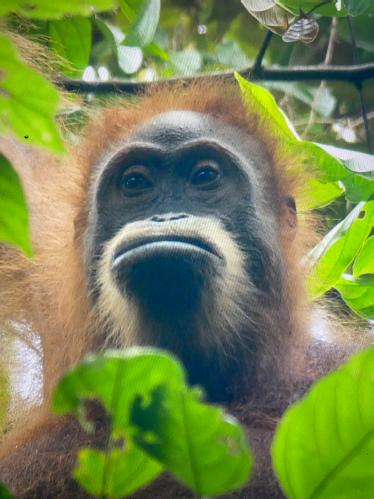Press Releases
“A consonant please, Rafiki!” Primate Countdown, the ancient shift from vowels to consonants
Experts from the University of Warwick have found that the shift from dense forests to open plains during the Miocene Era might have prompted humans' ancient ancestors to change their vocal calls. This change, observed in modern orangutan calls, indicates a transition from vowel-based to consonant-based sounds, possibly linked to the evolution of early human communication.
Around 5.3 to 16 million years ago, the middle and late Miocene Era, Africa's landscapes turned from forests to wide-open grasslands. This change pushed ancient primates, or hominids, out of trees and onto the ground. Since soft tissues don't last in fossils, we can't know for sure how this landscape change affected their voices. However, great apes make both vowel-like and consonant-like sounds. Orangutans in particular make these in combination, similar to a syllable, and as the only great ape that spends most of their time in the trees, they are an ideal model to test what happened for our ancestors when they moved from the treetops to the ground.
Researchers Charlotte Gannon and Dr Adriano Lameira from the University of Warwick, along with Professor Russell Hill from Durham University, studied audible orangutan calls in a South African savannah. They played 487 calls from Sumatran and Bornean orangutans and recorded their audibility at intervals of 25 meters, covering a distance of 400 meters. Their findings showed that consonant-based calls remained audible over longer distances compared to vowel-based calls. Around 80% of consonant-based calls were audible at 400 meters, while less than 20% of vowel-based calls remained audible at the same distance.
This research suggests that consonant-based calls are more effective in open landscapes. As consonants play a significant role in modern human languages, the authors suggest that the transition to open plains might have been pivotal in shaping early hominid vocal communication.
PhD researcher at the University of Warwick, Charlotte Gannon said: "Our results show that living great apes are time-machines of sorts that allow us to re-play key stages in the evolution of speech, language, and ultimately, of the human mind.
Dr Adriano Lameira, Primatologist and evolutionary psychologist at the University of Warwick said: "The emergence of spoken language during the process of human evolution is often attributed to new advanced mental and cognitive capacities that our ancestors gained access to, but we often fail to appreciate that organisms only gain new features and traits by adaptation to new environments and new challenges. Our findings pose the intriguing possibility that all the world's languages include consonants because our ape-like ancestors descended from the trees due to climate change millions of years ago, bringing with them consonant sounds that proved much more effective than vowel sounds for distance communication on more open and dry landscapes."
ENDS
For more information and interview requests, please contact:
Bron Mills
Bron.mills@warwick.ac.uk
+447824540720
